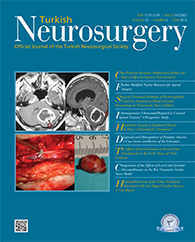2Wuxi Ninth People’s Hospital Affiliated to Soochow University, Department of Orthopedic Surgery, Wuxi, Jiangsu, China DOI : 10.5137/1019-5149.JTN.7939-13.0 AIM: To investigate the factors related to the local recurrence-free survival time (LRFS) after surgical treatment of GCT of the sacrum and mobile spine combined with preoperative embolization.
MATERIAL and METHODS: We retrospectively reviewed 28 consecutive patients with GCT of the sacrum and mobile spine who underwent initial surgical excision combined with preoperative embolization between 1995 and 2011. Data regarding age, gender, tumor location, tumor size, tumor extension, radiation therapy, and local recurrences were reviewed and analyzed statistically.
RESULTS: All patients underwent intralesional resection. The average duration of follow-up was 86.4 months (range, 15 - 193 months). 8 (28.6%) patients developed local recurrence. The average recurrence time was 35.6 months (range, 5 - 79 months), and the local recurrencefree survival rates at 3 and 5 years were 89.1% and 75.5%, respectively. LRFS was found statistically longer in intracompartmental (T1) tumors as compared with extracompartmental (T2) tumors (P<0.05), but not for age, gender, tumor location, tumor size, or radiation therapy.
CONCLUSION: Intralesional excision with preoperative embolization is a feasible choice for T1 tumors of the sacrum and mobile spine, but for T2 tumors, more aggressive treatment may be required. The choice of surgical treatment should be balanced between the complications and tumor recurrence.
Keywords : Giant cell tumor, Spine, Local recurrence, Risk factor, Embolization




